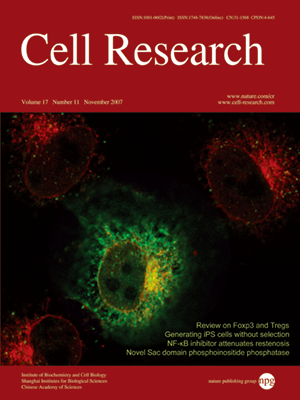
Volume 17, No 11, Nov 2007
ISSN: 1001-0602
EISSN: 1748-7838 2018
impact factor 17.848*
(Clarivate Analytics, 2019)
Volume 17 Issue 11, November 2007: 904-918
REVIEWS
Maintaining immunological tolerance with Foxp3
Lauren E Mays and Youhai H Chen
Department of Pathology and Laboratory Medicine, School of Medicine, University of Pennsylvania, Philadelphia, PA 19104, USA
Correspondence: Lauren E Mays Youhai H Chen(maysle@mail.med.upenn.edu yhc@mail.med.upenn.edu)
Central tolerance in the thymus is the primary mechanism for deleting autoreactive T cells. Despite this, escape of self-reactive T lymphocytes into the periphery reveals the threat of autoimmunity. To compensate for its imperfection, the thymus also produces a naturally occurring subset of Foxp3+ CD4+ CD25+ regulatory T cells with suppressive function, capable of controlling autoreactive cells. Foxp3 (forkhead box P3), the lineage-specific marker for this subset of cells, is crucial to their thymic development and peripheral function, and yet the transcriptional program driven by Foxp3 was until now largely undefined. Emerging evidence has provided insight into its role: from the ability of Foxp3 to cooperate with other transcription factors such as NFAT, to the genome-wide characterization of target genes directly bound and regulated by Foxp3. Here we discuss the discovery of naturally occurring regulatory T cells – their phenotype, development, maintenance, and function – largely as they are defined by the lineage-specific marker, Foxp3.
Cell Research (2007) 17:904-918. doi: 10.1038/cr.2007.84; published online 9 October 2007
FULL TEXT | PDF
Browse 1823


